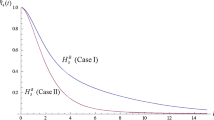Abstract
In this paper we discuss a general framework for single component replacement models. This framework is based on the regenerative structure of these models and by using results from renewal theory a unified presentation of the discounted and average finite and infinite horizon cost models is given. Finally, some well-known replacement models are discussed, and making use of the previous results an easy derivation of their cost functions is presented.
Similar content being viewed by others
References
Ash RB (1972) Real analysis and probability. Academic Press, New York
Asmussen S (1987) Applied probability and queues. Wiley, New York
Barlow RE, Proschan F (1967) Mathematical theory of reliability. Wiley, New York
Berg M (1980) A marginal cost analysis for preventive maintenance policies. European Journal of Operational Research 4:136–142
Berg M (1995) The marginal cost analysis and its application to repair and replacement policies. European Journal of Operational Research 82:214–224
Berg M (1996) Economics oriented maintenance analysis and marginal cost approach. In: Özekici S (ed) Reliability and maintenance of complex systems. Springer-Verlag, Berlin
Berg M, Epstein B (1979) A note on a modified block replacement policy for units with increasing marginal running costs. Naval Research Logistics Quarterly 26:157–179
Block HW, Borges WS, Savits TH (1988) A general age replacement model with minimal repair. Naval Research Logistics 35:365–372
Cleroux R, Hanscom M (1974) Age replacement with adjustment and deprecation costs and interest charges. Technometrics 16:235–239
Dekker R, Smeitink E (1991) Opportunity based block replacement. European Journal of Operational Research 53:46–62
Feller W (1971) An Introduction to probability theory and its applications, volume 2. Wiley, New York
Fox B (1966) Age replacement with discounting. Operations Research 14:535–537
Frenk JBG, Dekker R, Kleijn MJ (1996) A unified treatment of single component replacement models. Technical Report 9602/A, Econometric Institute, Erasmus University Rotterdam, The Netherlands, report available on internet http://www.eur.nl/few/ei/papers
Loeve M (1977) Probability theory I. Springer-Verlag, New York
Makis V, Jardine AKS (1991) Optimal replacement of a system with imperfect repair. Microelectron. Reliability 31:381–388
Makis V, Jardine AKS (1992) Optimal replacement policy for a general model with imperfect repair. Journal of the Operational Research Society 43:111–120
McCall JJ (1965) Maintenance policies for stochastically failing equipment: A survey. Management Science 11:493–524
Mikolas M (1994) Real functions, Abstract spaces and orthogonal series. Akademia Kiadó, Budapest
Muth EJ (1977) An optimal decision rule for repair vs. replacement. IEEE Transactions on Reliability 26:179–181
Nakagawa T, Kowada M (1988) Analysis of a system with minimal repair and its application to replacement policy. European Journal of Operational Research 12:176–182
Pierskalla WP, Voelker JA (1979) A survey of maintenance models: the control and surveillance of deteriorating systems. Naval Research Logistics Quarterly 23:353–388
Ran A, Rosenlund SI (1976) Age replacement with discounting for a continuous maintenance cost model. Technometrics 18:459–465
Ross SM (1970) Applied probability models with optimization applications. Holden-Day, San Francisco
Schaeffer RL (1971) Optimum age replacement with an increasing cost factor. Technometrics 13:139–144
Sherif YS, Smith ML (1981) Optimal maintenance models for systems subject to failure — a review. Naval Research Logistics Quarterly 28:47–74
Sivazlian BD (1973) On the discounted replacement problem with arbitrary repair time distribution. Management Science 19:1301–1309
Valdez-Flores C, Feldman RM (1989) A survey of preventive maintenance for stochastically deteriorating single component systems. Naval Research Logistics Quarterly 36:419–446
Van Weeren S (1995) Single-component maintenance and fractional programming. Master Thesis, Econometric Institute, Erasmus University Rotterdam, The Netherlands
Wolff RW (1989) Stochastic modelling and the theory of queues. Prentice Hall, London
Zijlstra M (1979) Regenerative replacement policies with general cost structures. ISA-Research-SP note 92 (second revised edition), N. V. Philips, Eindhoven
Zijlstra M (1981) Renewal replacement policies for one unit systems. European Journal of Operational Research 8:289–293
Author information
Authors and Affiliations
Rights and permissions
About this article
Cite this article
Frenk, H., Dekker, R. & Kleijn, M. A unified treatment of single component replacement models. Mathematical Methods of Operations Research 45, 437–454 (1997). https://doi.org/10.1007/BF01194789
Issue Date:
DOI: https://doi.org/10.1007/BF01194789




